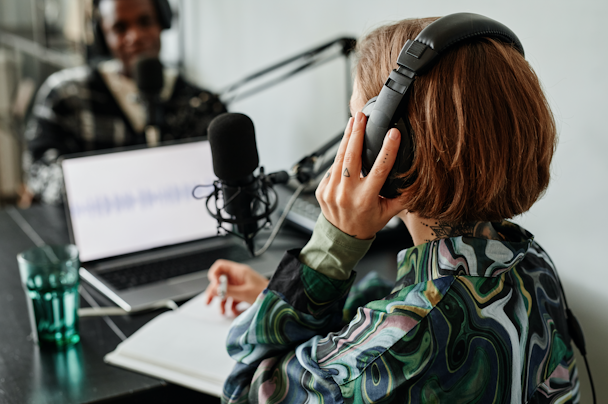7 podcast incubators keeping an ear out for the sound of tomorrow
From a scheme to uplift Latinx creatives to a program aimed at Black producers, as part of The Drum’s Audio Deep Dive we find out how podcast companies looking for the next big hit are providing a platform for diverse voices.

Several media platforms hope incubator schemes can help them discover new talent / seventyfourimages via Envato Elements
Media titans such as the BBC and Spotify are currently locked in competition to become the go-to platform for podcasting. Original content is a huge element of that rivalry and several platforms have launched incubator schemes to encourage and discover new audio talent.
Here, we take a look at seven incubator programs from platforms around the world.
Acast
Swedish podcasting platform Acast launched its Amplifier scheme back in January with the aim of seeking out talent new to podcasting. It is providing grants of £2,500 to three British podcasters to launch new series, a follow-on from its earlier Aclass Essentials resources program for early-stage podcasters.
UK content director Sam Shetabi says: “[Amplifier will] provide tomorrow’s podcast creators with everything they could possibly need to get their ideas out into the world and I can’t wait to hear their applications. We’re about to uncover the next great British podcast.”
BBC
BBC Sounds Audio Lab is the Beeb’s new ’accelerator’ program for podcast producers. Launched this year, it has given six creators bespoke training and mentoring at one of the world’s biggest media organizations, as well as production and commissioning support plus marketing and promotion of the final products.
Khaliq Meer, Audio Lab’s commissioning executive, explains: “We set out to reach emerging creatives across the UK with great ideas and energy but in need of real backing to bring their imaginations to life. What really excites me about our first-year group isn’t just their raw talents, but their fresh takes and unique lenses on stories and subjects everyone needs to know about.”
Louisville Public Media
Louisville Public Media, a media non-profit based in Kentucky, offers a scheme that aims to make podcasting accessible to the local community. Participants work with the company’s producers to develop their ideas then record and edit a full season of their podcast concept. The program is aimed at developing shows from people of color, marginalized genders and those with taxing family and work commitments.
“We are great at audio storytelling at LPM, but not every story is ours to tell,” says director of podcasts and special projects Laura Ellis. “Some conversations are better had by folks whose lived experiences inform them. This initiative is meant to empower people in our community to own and tell their own stories and to have those important conversations.
NPR
NPR has had huge success with its podcasts, which include Wait Wait… Don’t Tell Me, Tiny Desk Concerts and It’s Been A Minute. This year, it began working with LAist Studios to launch an audio talent accelerator aimed at Latinx podcast creators, called Oye.
“Through Oye, we aim to uplift Latinx creatives who can reflect their lived experience and their communities in a way that feels authentic to them,” says Lauren Gonzalez, senior manager of content development at NPR.
The scheme offers audio creators a paid six-week virtual workshop involving training, coaching and the resources needed to develop and produce a pilot episode.
It’s not NPR’s first foray into incubator programs. Story Lab, its creative studio established in 2016, started out as an internal podcast incubator. It now helps lead the group’s collaborative networks with partner stations and generates new ideas for pilots and segments.
SemaBox
Kenyan podcast producer SemaBox, a startup launched in 2020, claims to operate the biggest podcast incubator on the African continent. Dada, its incubator program, is focused solely on women creators in Uganda, Kenya and South Africa and offers $15,000 worth of production and recording support, as well as training in marketing, production and distribution. In June, it launched the second edition of the scheme. Last year’s inaugural slate featured eight podcast projects.
Spotify
Sound Up, the podcast incubator run by ubiquitous audio platform Spotify, is probably the largest such program in the world. Established in 2018, it runs in 14 countries and supported over 140 podcast creators in 2021. The scheme is a key element in Spotify’s claim to own the podcasting space, alongside its aggressive and deep-pocketed acquisition strategy.
Each year, Spotify selects 10 participants for a four-week training program in audio production and story development. They then receive a year’s worth of support while developing Spotify Original pilot episodes.
Past Sound Up graduates include Titi Shodiya and Zakiya Whatley of Dope Labs, Rowdie Walden of Search Engine Sex and Kacie Willis of You Heard Me Write. Spotify also operates Behind The Mic, an apprenticeship program aimed at Black podcast producers in the US.
Syn Media
Australian youth media company Syn launched a podcast incubator back in 2019 to discover the next generation of audio talent. The incubator is open to five producers each year, all under the age of 26, with each receiving mentoring, production training and development support.
It has helped several podcast creators establish a foothold with listeners, including comedian Grace Valerie-Lynnette of Twinemies or millennial-aimed debate series The Subtlety of It. Since its launch, the incubator has won awards for its work and released four original podcasts.
For more on the power of sound, check out The Drum’s Audio Deep Dive.

